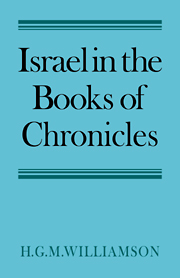Book contents
- Frontmatter
- Contents
- Foreword
- List of Abbreviations
- 1 Introduction
- PART ONE The Extent of the Chronicler's Work
- 2 2 Chronicles 36: 22f. and Ezra 1: 1–3a
- 3 The Evidence of the Greek Versions
- 4 Vocabulary and Style in Chronicles, Ezra and Nehemiah
- 5 Ideology
- 6 The Start of the Chronicler's Work
- PART TWO The Concept of Israel in the Books of Chronicles
- Bibliography
- Index of Passages Cited
- Index of Modern Authors
- General Index
3 - The Evidence of the Greek Versions
Published online by Cambridge University Press: 26 February 2010
- Frontmatter
- Contents
- Foreword
- List of Abbreviations
- 1 Introduction
- PART ONE The Extent of the Chronicler's Work
- 2 2 Chronicles 36: 22f. and Ezra 1: 1–3a
- 3 The Evidence of the Greek Versions
- 4 Vocabulary and Style in Chronicles, Ezra and Nehemiah
- 5 Ideology
- 6 The Start of the Chronicler's Work
- PART TWO The Concept of Israel in the Books of Chronicles
- Bibliography
- Index of Passages Cited
- Index of Modern Authors
- General Index
Summary
In seeking to determine the extent of the Chronicler's work, the evidence of i Esdras has been used in two ways: the fact that it begins at z Chr. 35:1 and continues through into Ezr. without a break (and without the overlap of the end of 2 Chr. and the beginning of Ezr.) is said to show that this is the original condition of the text. Secondly, many scholars have gone further and claimed that 1 Esdras in fact represents for the most part the original ending of the Chronicler's work. Since the latter suggestion naturally involves the former, the two may be dealt with together.
It is fortunate that the recent work by K.-F. Pohlmann sets out to justify precisely this position. The work takes full account of previous discussion and arranges its material in an orderly and coherent manner. It will be simplest, therefore, to follow the order of Pohlmann's work here, though because some sections will need more detailed treatment than others, I shall use my own enumeration.
PRELIMINARY CONSIDERATIONS
The first thirty or so pages of Pohlmann's book constitute a clear statement of the problem in hand and a brief survey of the major positions that have been held in the past concerning it. In order to clear the ground of a few of the many suggestions that have been put forward, we may agree that since Nestle's work it has not been possible to hold to Keil's position that 1 Esdras is dependent upon Esdras b. Nestlé produced a number of instances where 1 Esdras is clearly based on an alternative reading or misunderstanding of the Hebrew text.
- Type
- Chapter
- Information
- Israel in the Books of Chronicles , pp. 12 - 36Publisher: Cambridge University PressPrint publication year: 1977



